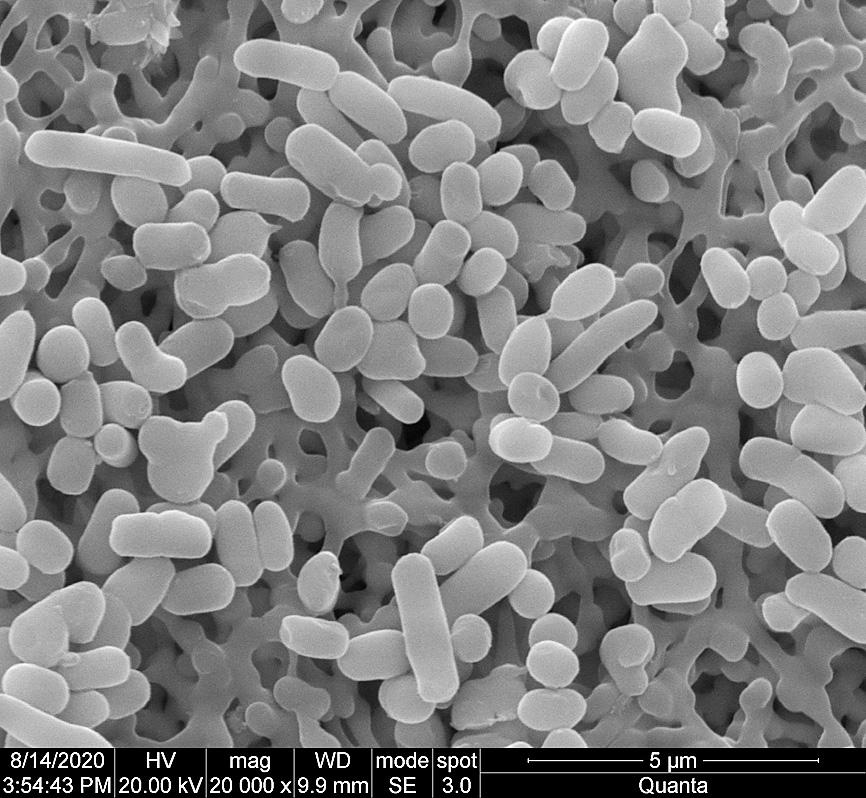Academia Sinica President James Liao (廖俊智) and a research team yesterday said that they have developed the world’s first synthetic bacterial strain that can convert methanol into valuable chemicals, signaling new possibilities for recycling carbon.
Team members shared their findings at a news conference at the institution in Taipei, after their paper, titled “Converting Escherichia coli to a Synthetic Methylotroph Growing Solely on Methanol,” was published in the journal Cell on Monday last week.
Some bacteria in nature, namely methanotrophs, can convert methane — a greenhouse gas — into methanol and subsequently utilize methanol as a food source, but current scientific techniques could not easily modify its DNA to produce valuable products, said Frederic Chen (陳育孝), the lead author of the paper.

Photo courtesy of Academia Sinica
Chen said that he just last week finished his doctorate defense with the University of California, Los Angeles, where he was Liao’s student.
While existing industrial techniques can convert methane into methanol, they require large amounts of electricity to produce high pressures and temperatures of up to 500°C only to produce low-value industrial products, he said.
Scientists have been hoping to develop a synthetic methylotroph since the idea was broached more than a decade ago, and the Academia Sinica team is the first to succeed in the effort, Chen added.
The team achieved the result by identifying the key enzymes regulating E. coli through a metabolic prediction model and reprogramming E. coli into a synthetic methylotrophic strain through genome editing tools and artificial evolution, he said.
The technique can convert methanol into valuable chemicals, medicines, and fuels, forming a carbon cycle with high green economic value that can help with carbon reduction, he added.
The new strain only possesses three foreign genes different from ordinary E. coli and can be cultivated at a temperature of 37°C, he added.
The research was conducted by Academia Sinica members, Liao said, adding that electron microscopy, proteomics and three different gene sequencing techniques were keys to characterizing the synthetic strain.
All techniques applicable to ordinary E. coli would also be applicable to the synthetic strain, he said.
The journal’s reviewers hailed the findings as “setting the new standard for synthetic biology,” Chen said.
While they are using methanol as the feedstock and the synthetic bacteria as a biocatalyst, they hope to make the strain able to feed on carbon dioxide and methane in a bid to alleviate greenhouse effects, Chen added.

Taiwanese can file complaints with the Tourism Administration to report travel agencies if their activities caused termination of a person’s citizenship, Mainland Affairs Council Minister Chiu Chui-cheng (邱垂正) said yesterday, after a podcaster highlighted a case in which a person’s citizenship was canceled for receiving a single-use Chinese passport to enter Russia. The council is aware of incidents in which people who signed up through Chinese travel agencies for tours of Russia were told they could obtain Russian visas and fast-track border clearance, Chiu told reporters on the sidelines of an event in Taipei. However, the travel agencies actually applied

Japanese footwear brand Onitsuka Tiger today issued a public apology and said it has suspended an employee amid allegations that the staff member discriminated against a Vietnamese customer at its Taipei 101 store. Posting on the social media platform Threads yesterday, a user said that an employee at the store said that “those shoes are very expensive” when her friend, who is a migrant worker from Vietnam, asked for assistance. The employee then ignored her until she asked again, to which she replied: "We don't have a size 37." The post had amassed nearly 26,000 likes and 916 comments as of this

New measures aimed at making Taiwan more attractive to foreign professionals came into effect this month, the National Development Council said yesterday. Among the changes, international students at Taiwanese universities would be able to work in Taiwan without a work permit in the two years after they graduate, explainer materials provided by the council said. In addition, foreign nationals who graduated from one of the world’s top 200 universities within the past five years can also apply for a two-year open work permit. Previously, those graduates would have needed to apply for a work permit using point-based criteria or have a Taiwanese company

The Shilin District Prosecutors’ Office yesterday indicted two Taiwanese and issued a wanted notice for Pete Liu (劉作虎), founder of Shenzhen-based smartphone manufacturer OnePlus Technology Co (萬普拉斯科技), for allegedly contravening the Act Governing Relations Between the People of the Taiwan Area and the Mainland Area (臺灣地區與大陸地區人民關係條例) by poaching 70 engineers in Taiwan. Liu allegedly traveled to Taiwan at the end of 2014 and met with a Taiwanese man surnamed Lin (林) to discuss establishing a mobile software research and development (R&D) team in Taiwan, prosecutors said. Without approval from the government, Lin, following Liu’s instructions, recruited more than 70 software